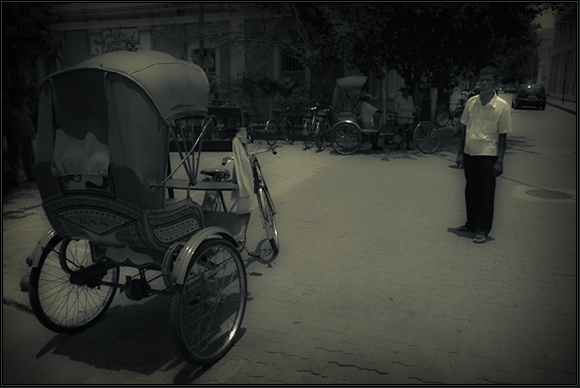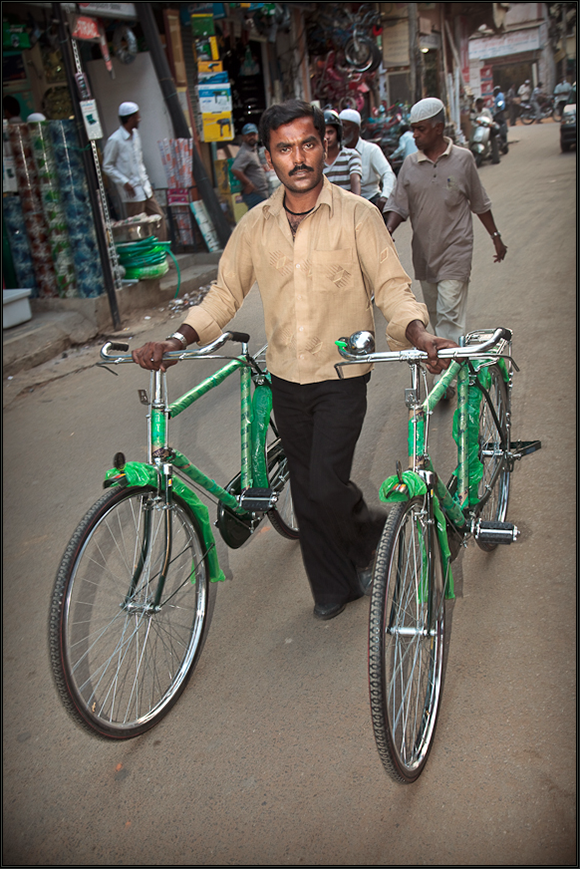.
[kml_flashembed fversion=”8.0.0″ movie=”/wp-content/slideshows/ssp_bikeparts/ssp_bikeparts.swf” targetclass=”flashmovie” base=”.” publishmethod=”static” width=”580″ height=”387″ allowfullscreen=”true”/]
.
Check out the details on this cast-iron baby. The metal frame around the rear reflector (note the Atlas logo in the reflector itself), the metal badging on the rear fender and the seat, the incredible “hood ornament” on the front fender, the rack (fully unfolded to show its amazing load bearing capacity), and the chili-and-lime puja threaded to the front hardware. These bikes are a throwback to 50 years ago, built substantial and heavy, free of ergonomic considerations; the antithesis to what we seek out in a bike back home in the States. But here in India they are omnipresent artifacts, on every street in the country, the used relics indistinguishable from the brand new.
Posts Tagged ‘bicycle’
The Midnight Guilt Chariot

.
After a late dinner on a scorching night at a French/Indian fusion restaurant in Pondicherry, Nina and Andrew wave us into a bicycle rickshaw, as they climb into a tuk-tuk. At this moment, nothing seems more romantic than a sweet moonlight ride through the beautiful town we’ve spent the last 48 hours falling in love with.
From the mid-1600’s through 1961, Pondicherry was a French Colony. Since then, it’s been a Union Territory of India, and has been re-named “Puducherry,” but everyone just calls it “Pondy.” The small coastal town is a sweet mixture of French colonial and Indian chaos: ashrams and avenues, wrought iron balconies, and cars that play Christmas carols when they back up. The street signs are printed in French, English, and Tamil. The locals still speak an Indian version of French, and a ten-foot tall elephant blesses anyone who passes his temple. In short, Pondy is as strange as the rest of the country, but for an entirely different set of reasons.
![]()
We wave to our friends as the driver pedals the rickshaw away from the curb.
“I am soooo full,” I say, patting my stomach with satisfaction. “That’s the first time I’ve had steak in months!”
French and Indian foods really don’t fuse well together. The Béarnaise sauce that was on my steak was bright orange and lumpy with onions, the bleu cheese on Phil’s steak was neither bleu, nor cheese. Still, the dishes weren’t bad, but they weren’t French either.
Phil’s hand brushes against his shirt pocket.
“Oh, look,” he says, reaching in. “An extra 1000 rupees!”
Our happy chipmunk chatter is derailed by the rhythmic lumbering of the rickshaw. Like a child on a bike far too big, the driver lifts up his lithe body, leans heavily on one pedal, then the next, using his full weight for leverage. The bike lurches slowly through the darkness and the romance of the ride begins to fade. Halfway down the block there is the slightest incline, and he pumps with all his might. We barely move. We are mortified.
“Should we get out ?” Phil asks.
“No, no, no. You are my only customer tonight.”
We sit tight, in awkward silence, and slide slowly through the street, watching sweat glisten on the driver’s thin brown arms. We can see his ribs through his clinging tee-shirt. The rickshaw rolls past a family sleeping on the sidewalk; it is hot and sleep has stripped them of modesty, and all of their clothing. Very slowly, we pass the maternity hospital where several families appear to be camped out like they’re waiting for a rock concert.
“My child born there,” the driver says.
Oh thank God, something to talk about, something cheerful. Children, something we can all relate to.
“How many children do you have ?” I ask.
“Five,” he says, “I had five children.”
The slowly moving contraption moves even slower, and the driver looks over his shoulder at us.
“But one died.”
Oh, crap. We express our condolences with pained facial gestures, our hands clutched to our chests to signify heartbreak.
“She died from eating stones,” he adds.
Neither of us know how to react, so we look at each other in that “silent scream” way that couples sometimes do. The white people are stumped. Our stomachs are full of this man’s sacred animal, and his child died from eating stones. We sink even deeper into the torn vinyl seat, hoping to push ourselves into another time zone.
Very slowly, we roll past another homeless encampment: everyone waves to us and shouts a cheerful hello, as if we are a one-float parade. These people are so good, so kind, and we are such assholes.
Phil and I have been seeing these beautifully decorated bicycle rickshaws all over India for months now, but it had never been the right time to grab one; turns out there is never a right time: this is not transportation, and it is certainly not romantic.
It is simply a guilt chariot.
![]()
We curve to the right and pass a small park with a large whitewashed statue of Ben Kingsley. More people are camped out at the base of the statue.
“At this place food is serving each morning for five hundred peoples. Many many hungry peoples here.”
Phil and I feel like a king and queen being carried through a battleground on a litter, peeking through silk curtains to take stock of the casualties. We want to get out and walk.
No – we want to get out and run.
A Jeep blazes past with a dozen men standing in the back waving communist flags, bright red with the yellow hammer and sickle symbols I’ve only ever seen before in ominous vintage propaganda films back home. It is election season in India, the world’s biggest secular democracy, as people from Rajasthan to Tamil Nadu are proud to tell us. The news is filled with saber-rattling, and a profusion of acronyms: BJP, CPI, DMK, LTTE… WTF.
We seize the opportunity to change the subject, away from the depressing topics of dead children and hunger.
“Are you going to vote ?” I ask.
“Yes, yes, I wote.”
“Good,” Phil and I both nod. “Woting is good.”
456 million Indian people live beneath the global poverty line, and 80% of India’s population lives in rural villages where education is sketchy at best. These conditions provide a perfect atmosphere for gross political manipulation. Stories of election season graft abound. Flat screen televisions and cash are given away to farmers. Road construction projects are started during the lead-up to election season, then come to a screeching halt soon after it ends, whether or not the promising party has been elected. But still, sixty percent of the people are exercising their right to vote, and that is a beautiful thing.
The driver looks over his shoulder and continues his laborious pedaling. “Maximum danger when elections we are having. Fifteen people killed already.”
Indians are a calm people, not easily angered, but elections are apparently a fiery affair. To reduce the chances of the entire country rioting at once, elections are held in different states at different times throughout a three-month period. Alcohol is banned for a few weeks leading up to the election in each state to keep emotions from becoming explosive.
“Last election my house catch fire,” the driver says, adding, “Coconut house, burn very quickly.”
We had passed these coconut houses on our way into Pondicherry. They were romantic and beautiful with dirt floors and naked babies, like a snapshot taken 100 years ago. And now we know that they can burn very quickly.
This guy is really starting to get on my nerves.
![]()
When we finally arrive at the hotel, Nina and Andrew are leaning against the wall, smoking like street thugs, with smirks on their faces. I can’t help but think that they had known what they were doing when they waved us into the bicycle rickshaw in the first place: showing us some tough love, so that when they leave India in a couple of weeks, they won’t have to worry about us being taken in by every Indian with a sob story. They are doing this by attempting to harden our hearts. It isn’t working.
The rickshaw comes to a stop; the driver climbs off and waves us over to the glow of the streetlight. He holds out a thin arm and points to a series of black ink marks near his shoulder.
“These are names of all my children,” he says.
We look closely at the choppy swoops and curves, and I find his gesture so moving that I want to rush out and get my own tattoo – of his children’s names.
“You enjoy ride ?” he asks.
“Yes, yes, good ride,” we lie. “How much ?”
He shrugs, “Whatever you say,” and then smiles. This guy should get a medal. Either he’s been living the best worst story on the planet, or we are seriously being played. We don’t really care which it is, the last 10 minutes has twisted us sideways and we’re both rummaging through our pockets furiously, ready to give him all we have.
This is how we are.
This is why our friends are worried.
We’ve Got A Bike !
[audio:Pink Floyd – Piper At The Gates Of Dawn – Bike.mp3|leftbg=0x232323|lefticon=0x4a4a4a|rightbg=0x171b18|rightbghover=0x212622|righticon=0x5dc94f|righticonhover=0x5dc94f|bg=0x171b18|track=0xff5d00|loader=0x000000|border=0x232725|slider=0x5dc94f]

.
We bought two new Atlas Goldline Super bicycles today. The bright green color in the picture above is protective wrap. The gentleman with the bikes is bringing them out to prepare them for delivery: we need heavy-duty racks in back, mine will have a top-guard only over the chains, they both need seats with big fat springs, and the most important part: installation of the signature Atlas hood ornament. Cost ? Sixty bucks.
The Atlas bicycles, as well as the Hero brand bikes, are ubiquitous in India; and by “ubiquitous,” we really mean ubiquitous: these beasts take people to work, to the movies, to the villages and back; and with the rack on the back they can hold a family of four, several bushels of produce or sticks, or, tied together properly, a moveable showroom of cane furniture. With a few alterations they can pull an ironing cart, a fruit vendors cart, a pony-cart schoolbus, or a barbershop in a box. Sounds weird but we will get around to posting on those subjects at some point ;) Anyway, like the beautiful Roya Enfield Bullet motorcycles and the Hindustan Ambassador automobiles, the designs are virtually unchanged from 50 years ago. I like that.
Tonight, Rathnama and the rest of our band of gypsies are planning on making a puja for the new bicycles, to keep the riders safe during the coming year. How cool is that?
No Learning. No Enlightenment.
We embarked on this trip chanting the mantra, “No learning, no enlightenment,” but in spite of this, in the past couple of weeks, there are several things that I have learned:
1. Indian traffic proves a point I’ve spent most of my life trying to make: there don’t need to be rules to for there to be harmony. Traffic here is insane, but what is crazier still is that no-one gets angry. No-one raises their voice. When a tuk-tuk pulls out in front of a car, the car slides around it; when you launch yourself into traffic as a pedestrian, the traffic moves around you like water, not stopping to question, just going with the flow.
2. It is possible to move a twenty-foot length of metal pipe on a bicycle at rush hour.
3. In India it is always rush hour.
4. Decoding the Indian wobble-head thing is impossible. It can mean yes, no, maybe, I don’t care, I am bored, etc., which in my book means that it actually means nothing. It does, however, make Westerners want to eat their own heads.
5. Even monks shop for DVDs and talk on cell phones.
6. Eating dal for breakfast ensures that you won’t get hungry until 4pm.